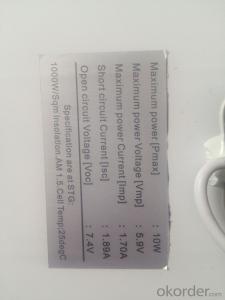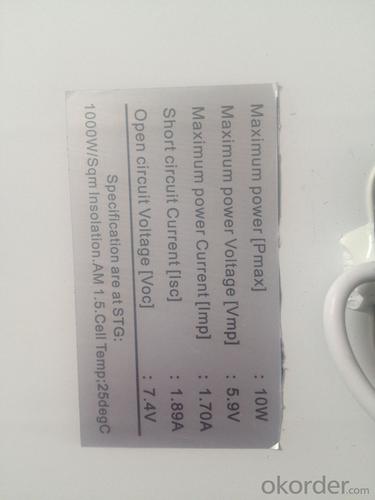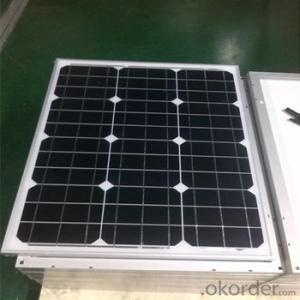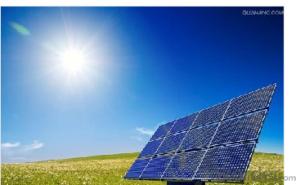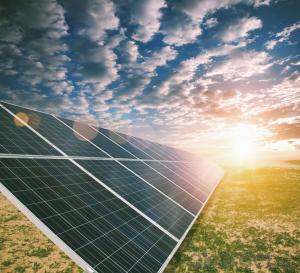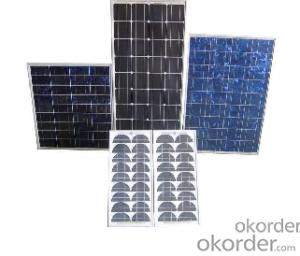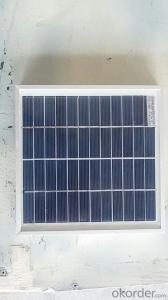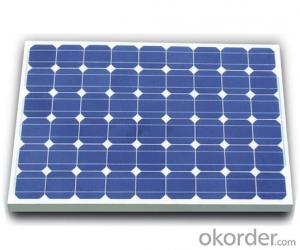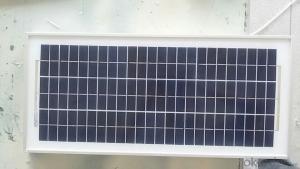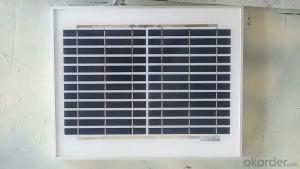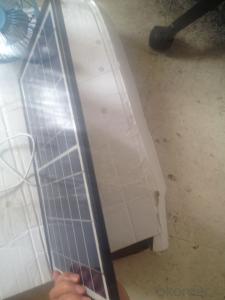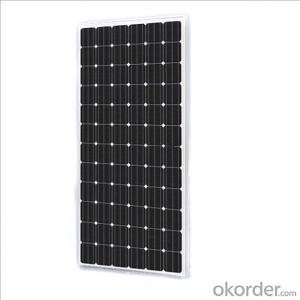Camper Solar Panels - 60W Monocrystalline Solar Panels for Solar Systems
- Loading Port:
- Shanghai
- Payment Terms:
- TT OR LC
- Min Order Qty:
- 10000 watt
- Supply Capability:
- 50000000 watt/month
OKorder Service Pledge
OKorder Financial Service
You Might Also Like
Product Description
Solar Monocrystalline Series Panels
Introduction of Monocrystalline Solar Panels
CNBM Solar photovoltaic (PV) Panel is designed for large electrical power requirements. It is the optimal choice for both on-grid and off-grid power systems. CNBM Solar panel offers high performance of power per square foot of solar array. Monocrystalline silicon(c-Si): often made using the Czochralski process. Single-crystal wafer cells tend to be expensive, and because they are cut from cylindrical ingots, do not completely cover a square solar cell module without a substantial waste of refined silicon. Hence most c-Si panels have uncovered gaps at the four corners of the cells.
Characteristics of Monocrystalline Solar Panels
I Solar Cell : High efficiency crystalline solar cell. Even if under the weak light, the solar module can produce maximum power output.
II Tempered glass (toughened glass): Anti-reflecting coating and high transmission rate glass increase the power output and mechanical strength of solar module.
III EVA and TPT: Using high quality EVA and TPT to prevent destroying and water.
IV AI frame: Without screw, corner connection. 6 holes on the frame can be installed easily.
V Junction box: Multi function junction box with water proof.
VI Long lifetime: ≥25 years; Less power decrease
VII Good performance of preventing from atrocious weather such as wind and hails.
VIII Resisting moisture and etching effectively, not effected by geology.
Standard Test Conditions of Monocrystalline Solar Panels
The opto-electrical specifications shown below are stabilized values being measured at Standard Test Conditions, Irradiance: 1000W/m2, Spectrum: AM1.5 at 25°C, The info below is subject to manufacturing tolerances. Where appropriate minutes of measurement are available and are used for the dimensioning of the installation.
Advantages of Monocrystalline Solar Panels
1.High reliability with guaranteed -3% to +5% power output tolerance, ensuring return on investment
2. High conversion efficiency based on leading innovative photovoltaic technologies
3. Withstands high wind-pressure and snow load, and extreme temperature variations
4. Attractive appearance Unique frame design, high mechanical strength, and easy Installation
Characteristics of Monocrystalline Solar Panels
Max Power Voltage Vmp (V) | 17.4V | 17.6 V |
Max Power Current Imp (A) | 3.61A | 3.88A |
Open Circuit Voltage Voc (V) | 22.3V | 22.4V |
Short Circuit Current Isc (A) | 3.45A | 3.69A |
Max Power Pm (W) | 60W | 65W |
Temperature Coefficient of Cells
NOCT | 47℃±2℃ |
Temperature Coefficients of Isc (%/℃) | 0.06 |
Temperature Coefficients of Voc (%/℃) | -0.33 |
Temperature Coefficients of Pmp (%/℃) | -0.45 |
Mechanical Data Solar Monocrystalline Series
Power | 60W/65W |
Dimension | 820×550×30mm |
Weight | 5.6 kg |
Tolerance | ±3% |
The dimension of the modules can be changed according to the demand of clients Limits.
Operating Temperature | –45 °C to +80°C |
Storage Temperature | –45 °C to +80°C |
Max System Voltage | 700V |
Guarantee Solar Monocrystalline Series Panels
Products Guarantee | 10 years free from defects in materials and workmanship |
Performance Guarantee | No less than 90% within 10yrs and no less than 80% within 25yrs |
Certificates | IEC, ISO, TUV, CE |
Dimension of Solar Monocrystalline Series Panels
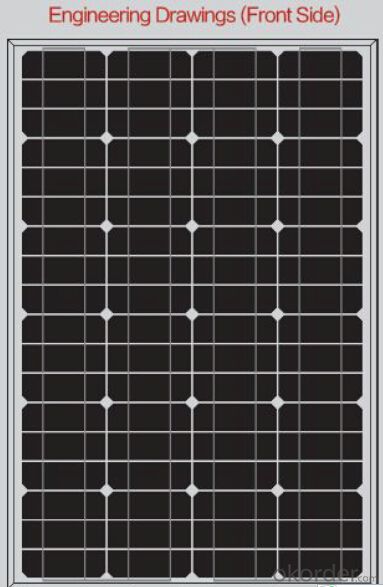
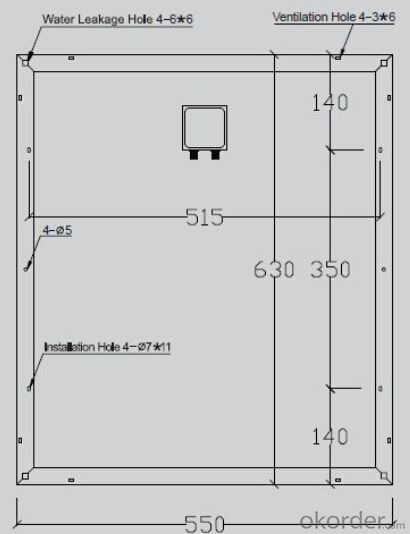
FAQ
We have organized several common questions for our clients,may help you sincerely:
1. What’s price per watt?
A: It’s depends on the quantity, delivery date and payment terms of the order. We can talk further about the detail price issue. Our products is high quality with lower price level.
2. Can you tell me the parameter of your solar panels?
We have different series of cells with different power output, both from c-si to a-si. Please take our specification sheet for your reference.
3. How do you pack your products?
We have rich experience on how to pack the panels to make sure the safety on shipment when it arrives at the destination.
4. What is your warranty system?
Our product performance guarantees for 25 years
• 12 years guarantee for workmanship
• Timeliness of delivery
• Quality Products certified (TÜV, UL, CE, ISO)
5. How do you pack your products?
We have rich experience on how to pack the panels to make sure the safety on shipment when it arrives at the destination.
- Q: How much money can you save by using solar panels?
- The amount of money you can save by using solar panels varies depending on several factors, such as the size of the system, your energy consumption, the cost of electricity in your area, and the availability of sunlight. On average, solar panels can save homeowners thousands of dollars over their lifespan, typically between 10-30 years. Additionally, solar panels can reduce or eliminate your monthly electricity bills and can even allow you to earn credits through net metering programs. While the exact amount of savings is difficult to determine without considering specific circumstances, solar panels offer substantial long-term financial benefits.
- Q: how much electricity will produce in Kwh by a 000 W solar panel in a sunny tropical area per day (good sunlight at least 0 hour a day)
- Solar cell has efficiency from 0% to 5% max. That is the technology we have as for now. It stated 000W, that means it could provide 000W under fully super condition . KWH is not a unit to rate solar panel, it was used for wattmeter that company installed in every house to monitor electricity usage.
- Q: Can solar panels be used in areas with high levels of hurricanes?
- Yes, solar panels can be used in areas with high levels of hurricanes. However, it is important to ensure that the solar panels are properly installed and secured to withstand the strong winds and potential debris that hurricanes can bring. Additionally, selecting hurricane-resistant solar panels and implementing proper maintenance and inspection procedures can help to mitigate potential damage and ensure their long-term functionality in these areas.
- Q: I recently bought a house with very old solar panels (about 25 years old) that don't appear to work properly. They are supposed to heat the hot water heater but they don't always work, and recently have staretd leaking. So, I have had them turned off and now we're just using electricity to heat the hot water. My question is, is there any tax credit money (stimulus or otherwise) available for people to (a) repair old solar panels or (b) replace them with new ones? How does the credit work?
- If you buy NEW solar panels, there is a credit. see the 040 icon at www.okorder
- Q: Can solar panels be installed on historical buildings?
- Yes, solar panels can be installed on historical buildings. However, the installation process may require careful planning and consideration to ensure that the historical integrity and architectural significance of the building are not compromised.
- Q: Can someone tell me the average savings you get PER solar panel installed? I do not have the money to invest in a bunch of them at once, so I am forced to buy one at a time, when I have the money. So how much can I expect to save after I buy the first one?
- No matter what or how you do it it is best to get off coal and nukes. So it cost a little bit of money you are buying 30 years of electric. How much will you spend adding in cost of living increases over the next 30 years? Solar really is pretty cheap if you take the time to do the long term math. If you use your cost at to days rates it does seem like a lot. But if you do the math like in real life with 3.5% compounded cost of living increases per year and 6.5% fuel increases per year. Well, you pay a lot more renting power. One other thing to think about and Al Gore keeps pointing it out is, Will your off spring be alive in 50 years from now if you don't buy the solar panel? Kind of like not going to the doctor because you can't afford the bill. Well I would rather owe a bill to a doctor that I will have trouble paying then not be alive at all to try. If you don't have the money to jump in and go full blown Green you should buy a starter system. You can get a system that can be expanded to 3000 watts (enough to power an energy efficient home). Would cost you about $8000 USD to get started and then you could add three solar modules at a time till you get it up to the 3000 watt max. And even have backup power. Or you could just buy a 000 watt system for about the same price and just add 3 of them over the years. There are many ways to get started. The deal is everyone needs to get started even if it is a small system. If all 50 million homes in the USA would install a small 000 watt system with 4 hours of sun light a day. We would provide (000 watts times 4 hours times 365 days times 50 million homes) 29,000,000,000,000 watts not from coal or nuke plants per year. I wonder if that would help?
- Q: Can solar panels be installed on warehouses?
- Yes, solar panels can be installed on warehouses. In fact, warehouses are often ideal locations for solar panel installations due to their large roof spaces, which can accommodate a significant number of panels to generate clean and renewable energy. Additionally, warehouses tend to have uninterrupted sunlight exposure, making them well-suited for solar energy generation.
- Q: Due to erratic power cuts in my area I want to make up by using a 30watt solar panel. My decoder is 30watt but my TV is 70W. I need something small. I don't have problem with sound. Just picture.
- Do what we do when power is cut (although we have very reliable power - we loose as much as 2 hours a year), is go Amish. That is go without powered technology. Now, for you, you need more than a solar panel (and likely more than 30W, but that is a start) - you need a battery or set of batteries to store the collected power. 20Ah might do. You need an inverter to power things. For that, likely a 300W will do. For a TV, go shopping, and look at the labels on the back of the TVs. I just bought a 24 TV rated at 40W. If you get a 9 LED TV, it may be likely you can run that directly from battery, for many have separate DC brick supplies. With those, you can make a cable to power it directly from a 2V or so battery, if the supply can make 2 to 5V. Depending on your provider, you may be able to get a mini-decoder which uses a separate brick or wall supply, which means the decoder likely can be directly battery powered. Such a decoder may draw less than 20W.
- Q: I am intrested in buying solar panels to save a buck and even maek some money off of it but I was wondering what kind? How Much? How Many? Are they easy to install? Whats the best brand? I want alot of information on this if anyone can give me some help on it in a user friendly way it would be appreciated!
- You're unlikely to 'save a buck' much less 'make any money off of it' at the present state of the art. The panels and equipment will cost more than you'll save in the next ten years. That might change with energy prices, but not enough any time soon.
- Q: I have two solar panels and I have measured that they produce V by themselves. I am trying to generate .5V, but whenever I hook them up in parallel I get something like .02V. What it happening?
- Build okorder /
Send your message to us
Camper Solar Panels - 60W Monocrystalline Solar Panels for Solar Systems
- Loading Port:
- Shanghai
- Payment Terms:
- TT OR LC
- Min Order Qty:
- 10000 watt
- Supply Capability:
- 50000000 watt/month
OKorder Service Pledge
OKorder Financial Service
Similar products
Hot products
Hot Searches
Related keywords
